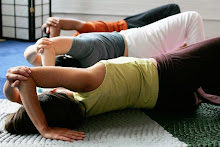
The smell of the freshly-ground coffee beans wafted up from the grinder as I opened the lid. I slowly sniffed and closed my eyes, anticipating the pleasure that was to come.
The aroma of bacon hangs in the kitchen. It is piping hot, fresh out of the skillet, and it awaits, draining, on paper towels. Soon, the floury scent of pancakes will mingle with the other odors. My stomach rumbles.
Hunger. Elimination. Sex. Curiosity. Sleep. Our bodily urges are more than ideas. They are appetites that must be fed for our organisms to survive and thrive.
Relax. You don't "feed" 24/7. Too much of anything crosses the line into addiction, dysfunction, pathology. Not talking about that here. I'm talking about those physical messages from our bodies that carry information and instructions for action. Was I hungry before I smelled the bacon, or did the smell of bacon make me hungry?
It's easy to view experience as a series of closed loops, an endless sequence of stimulus and response. I find this view of humankind to be depressing and limiting. There's a gap between stimulus and response, always, even for a nanosecond, even if you don't experience the gap. The gap affords a moment of awareness, engagement and choice.
Perhaps the most basic urge is the urge to move. Merely the act of breathing causes movement. Our heads move to orient the sense organs for sight, hearing, scent, and taste to align so that we can either respond or initiate action in the environment. Even the absent-minded fidget, a wiggle of comfort, confirms the fact that we were made to move. "Movement IS life," as Moshe Feldenkrais said.
The ever-presence of movement in our lives leads us to take it for granted. Why study movement? Why does paying attention to body movement improve the functioning of the muscles, joints, and more? Because body movement is the programming language of your central nervous system. Change the program, you change the output, or the results. Exercise is not enough. It's too easy to exercise on auto-pilot, without awareness. Repeat the same actions, expect a different result? The Feldenkrais Method provides nearly endless variety and interest to support and transform every move you make.
By the time you read this, I'll be in Boulder, Colorado, for the annual conference of the Feldenkrais Guild of North America. All week I'll be gratifying my urges to move and to learn, returning home next week, changed.



1 comment:
Boulder! Have a great time--I'll be reading!
Post a Comment